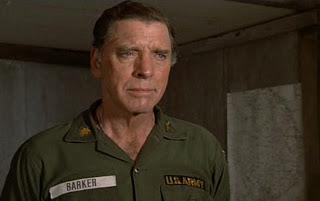
"That's the way the US kicks ass, Charlie!"
1978 saw the Vietnam War belatedly exploding onscreen, with Coming Home and The Deer Hunter competing for box office and Oscars. Ted Post's Go Tell the Spartans (1978) was lost in the shuffle. Despite its much-smaller budget, Spartans is no less ambitious, an overachieving B Movie puffed into a significant statement.Major Barker (Burt Lancaster) commanders a small party of American advisors in the Vietnam War's early days. Ordered to defend the abandoned village of Muc Wa, sends a small detachment of South Vietnamese militia and American advisors led by Lieutenant Hamilton (Joe Unger). Outnumbered and cut off, Hamilton's command dwindles under siege by the Vietcong. Baker tries to relieve them, stymied not by the Vietcong but his meddling superiors. Eventually, Baker disobeys orders to save the situation.
Go Tell the Spartans tries to definitively "explain" the war. Wendell Meyers' script is a mushy amalgam of stock characters and allegories, grafting every Vietnam cliché onto our platoon. The Americans are burned-out veterans, gung-ho gomers or dope freaks; the South Vietnamese are bloodthirsty incompetents, the VC inscrutable. There are superiors who micromanage field operations, mutton-headed intelligence operatives, South Vietnamese officials more concerned with potential coups than warfare. Muc Wa stands for America's whole Indochinese adventure, a symbolic action without tangible value.
Hence the headache-inducing homilies. There's Corporal Abraham Lincoln (Dennis Howard) reciting the Gettysburg Address, stoned, during a mortar barrage, or characters pondering the titular Simonides poem over a French cemetery. Another scene has Corporal Courcey (Craig Wasson) charm peasants with chocolate while his ARVN colleagues menace them with rifles. "It's their war and their country," Baker declaims; in another scene, Lieutenant Hamilton muses "We can't lose - we're Americans!" Everything's too on the nose, down to its "deep" closing scene.
Director Ted Post fares best with economical action. Meyers mixes homilies with believable soldiers' patter, full of unrefined profanities and slurs (the VC are "gooks" and "dinks") that seem authentic. Shot in California, Spartans works by keeping its scope modest. The battles are confused actions, emphasizing confusion and casualties over excitement. Post stages the combat scenes as attritional struggles without a clear victim; tellingly, the final nighttime firefight ends just before climaxing.
Burt Lancaster gives an understated turn, playing a bone-weary soldier who foresees disaster but can't stop it. The anonymous cast is adequate: Jonathan Goldsmith, future "Most Interesting Man in the World," scores best as a tough sergeant, with David Clennon (Gone Girl), John Megna (To Kill a Mockingbird), Craig Wasson and Joe Unger assaying other ranks. Evan C. Kim (The Dead Pool) plays a gung-ho ARVN officer who's either psychotic or savvy; James Hong (The Sand Pebbles) and Clyde Kusatsu are also recognizable.
If Go Tell the Spartans were content as a war movie, it might be a minor classic. Too bad Post and his writers try crafting a definitive postmortem of Vietnam. That said, its overreaching works better than The Deer Hunter, or the following year's Apocalypse Now.

